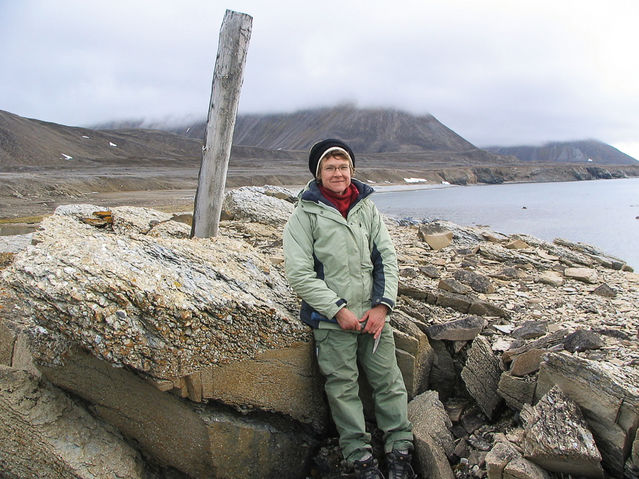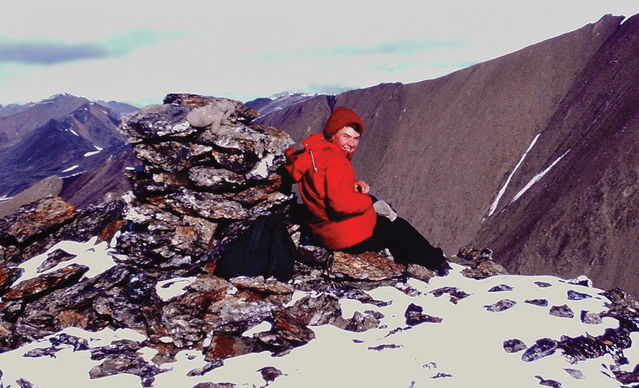Life in 4-D
Marcia Bjornerud has spent a career thinking of time in eras, periods, and epochs—and argues we could all benefit by taking a similarly big step back.
By Matt Huston published September 4, 2018 - last reviewed on November 6, 2018

Since her days as a young geologist mapping rock formations in the Arctic, Marcia Bjornerud has endeavored to interpret, like a planetary detective, the signs of geologic change. With Timefulness: How Thinking Like a Geologist Can Help Save the World, the professor at Lawrence University in Wisconsin delivers a brisk biography of Earth. Aside from charting the rise of mountains and the transformation of the atmosphere, she shows us why—given an uncertain future—taking the long view is more critical than ever before.
How does timefulness differ from timelessness?
Timefulness is an appreciation of the effect of time on everything, as opposed to the idea of things being unchanging and perfect forever, which is a lot less interesting and not true of almost anything.
That difference seems vital given the threats we face from climate change.
We have the dangerous illusion, because of our lifespans, that Earth’s landscapes are eternal. They’re not. They can change much more quickly than we used to think they could. There’s an irony in that the first century or two of geology was spent trying to convince the public of the immense antiquity of Earth and how slowly things change. And now the narrative we’re trying to promulgate is that sometimes the planet can change really fast and that we’re part of that.
Climate change stirs up a lot of fear and anxiety. Should it?
Those emotions can be motivating to some extent, but they can also be paralyzing. I don’t have a simple answer. My hope is that if people have a clear sense of how long things take, they will begin to have a sense of the steps needed to start solving problems. Evolution happens slowly; extinction happens fast. In the climate system, cooling happens slowly, typically, and warming happens fast. We can consume resources so much faster than they accumulate.
As someone who speaks multiple languages, do you see parallels between language and geology?
In translating text, if you’re not a native speaker, you might miss subtleties like idioms or metaphors or references from other texts. There are also different levels of sophistication in reading rocks. As we develop a deeper understanding of geologic processes that form different kinds of rocks—and new approaches to taking rocks apart and analyzing them—we recognize new nuances. To me, geology is the etymology of the world. It makes it seem more orderly and logical. It’s not an arbitrary constellation of things; everything has evolved from some origin.
Has time-consciousness helped you in difficult moments? Could it help others?
I think there is some sort of solace in knowing you’re embedded in this very deep, old story that we all share. More broadly, geology brings together people of different generations and cultures, and we’re all focused on this story that’s outside us. It’s a really powerful way to build communities, and in that sense, the science has been personally very healing and sustaining for me.

How else does nature instill a communal spirit?
There’s nothing like a natural disaster to remind us of our basic, collective needs. But if we could have that without facing catastrophes all of the time, we’d be much happier. During the eclipse last year, so many people felt, Oh my God, I’m embedded in the cosmos. If we could try to think that way more frequently, we might be able to make progress on the problems that all of us face.
How has your work in the field shaped your outlook on nature?
It’s very humbling. Nature is so much messier than our idealized versions of it. So it really requires attention and openness. You have to be ready to drink in all the clues you can find, but also filter out things that may be distractions. You might have only a few outcrops here and there, and you have to be able to tell a plausible narrative based on really limited information. You have to literally think in four dimensions.
Did being a woman in a male-heavy field influence you in any way?
I think being the only woman in classrooms gave me an outsider’s perspective. I remember feeling like an anthropologist looking in on another culture, making mental notes of its practices and norms. I think it helps me give others a glimpse inside that world.
Why aren’t people more invested in the story of Earth?
We are, frankly, fairly narcissistic as a species, and we find our own stories the most interesting. If we can recognize ways that we are reflected in the natural world—or that the natural world is all around and in us—then it’s more likely that we will feel some sympathy. I think in some ways, in a world that constantly consumes novelty, we’re losing the appetite for natural history. But there are such rich stories.
How does your approach to time intersect with your nonacademic life?
When I swim, I go into a space where I’m not in any particular moment in time. Skiing is the same. Everyone needs something like that. We have a ski marathon in Wisconsin, the Birkebeiner, that’s become sort of a marker of climate change: Last February, it was cancelled because we had 80-degree weather. It’s similar with ice fishing, which I’m not much involved in. People acknowledge, “The season’s really short now—we used to be able to go out on the ice in November.” The awareness is wrapped up with their own traditions and experience.
When thinking about the future of the planet, what else captivates you?
If I could go back to school, I’d become a microbiologist, because I have come to realize that microbes are in charge. They’re going to inherit the planet one day, and they’re so sophisticated. I’d like to understand them better.
